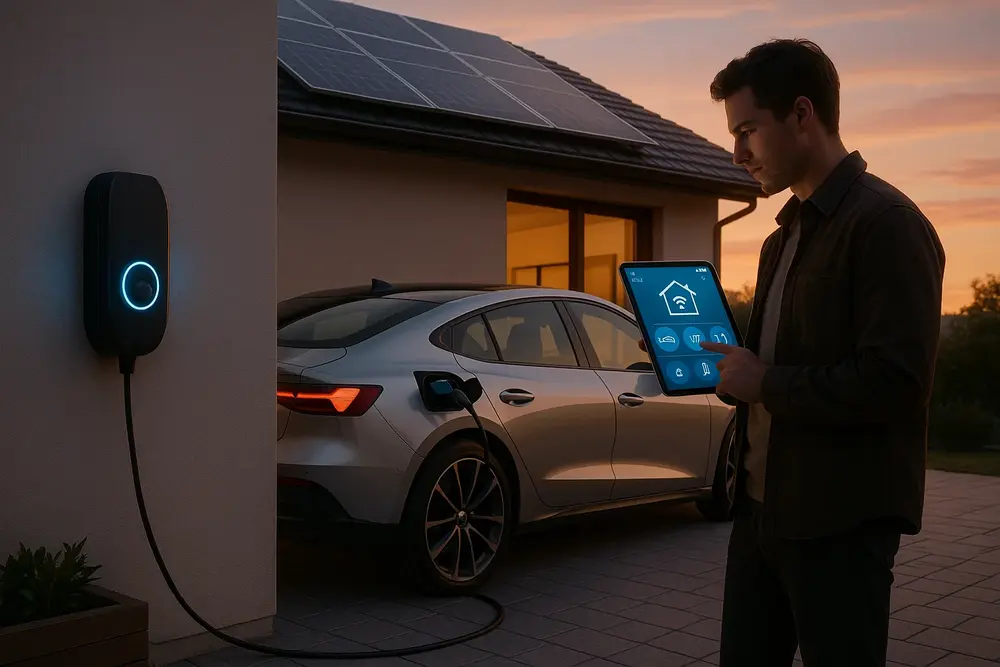Does the EV Charger Brand Really Matter? A Smart Buyer’s Guide
With the increasing shift toward electric vehicles (EVs), many homeowners are now exploring the best EV charging solutions for their properties. One of the most common questions asked during this process is: “Does the brand of EV charger really matter?” In most cases, the answer is no—most EV chargers are compatible with a wide variety of EV models. However, the differences lie in performance, features, and user experience, which can vary significantly by brand.

So, before choosing a charger simply based on cost or availability, here are some important factors to consider to ensure you get the best value for your investment.
Charging Power – How Fast Do You Need to Recharge?
EV chargers come in various power outputs, which directly affect how quickly your vehicle gets charged.
- Basic Level 1 units deliver around 3kW, which is sufficient for overnight charging but can take 12+ hours for a full battery.
- Mid-range Level 2 chargers, often rated at 7kW, offer significantly faster charging, usually completing a session in 4–8 hours.
- High-performance chargers with 22kW output are ideal for drivers who want rapid at-home charging—completing a full charge in under 2 hours for some compact EVs.
While a higher-power charger will typically cost more upfront, the added speed and convenience often justify the investment.
Tethered vs. Untethered Cables – What’s the Difference?
Another key factor when evaluating EV charger brands is the type and length of the charging cable.
- Tethered chargers come with a built-in cable, making it quick to plug in and go. However, cable length is fixed (often 5m or 7m), so placement needs to be carefully considered.
- Untethered chargers give you more flexibility by allowing you to use a separate cable. These units are typically more versatile, especially for multi-vehicle households or shared charging spaces.
Also, check connector compatibility. Most EVs in the UK and EU use Type 2 connectors, though Type 1 options are still available or can be supported via universal adapters.
AC vs. DC Charging – Understanding the Current
Electric vehicle chargers rely on alternating current (AC) or direct current (DC) for operation. Understanding this difference is crucial when selecting a modern EV charger.
- AC chargers are more common for residential use and connect directly to household power.
- DC chargers deliver power directly to the EV battery and are much faster—though more commonly found in public or commercial locations due to cost and installation requirements.
If speed is essential, look for home chargers with DC compatibility or invest in faster AC models with smart load-balancing features.
Smart Features – Go Beyond Basic Charging
Today’s top EV charger brands are offering far more than just a plug-and-play experience. Smart connectivity is becoming a must-have feature.
Look out for EV chargers with:
- WiFi or Bluetooth control
- Dedicated mobile apps for scheduling, remote operation, and consumption monitoring
- AI-based energy management that helps optimize cost-efficient charging during off-peak hours
- Integration with solar power systems for zero-emission energy usage
Smart chargers not only provide real-time data but also allow you to adjust charging behavior based on weather, electricity rates, or battery needs.
Why the Brand Still Matters
While most EV charger models adhere to industry standards, brand quality impacts durability, customer support, app performance, and firmware updates. A few premium brands invest more heavily in:
- R&D for efficiency and sustainability
- User-friendly interfaces and installation guides
- Compliance with UK government grant programs
A reputable brand also ensures your charger is future-proof, compatible with newer EV models, and secured with robust data protection.
Summary Table – Comparing Key Features
| Feature | Basic Chargers | Mid-Range Chargers | Premium Smart Chargers |
|---|---|---|---|
| Charging Power | 3kW | 7kW | Up to 22kW |
| Tethered/Untethered | Fixed or Flexible | Flexible | Both Options |
| Smart App | No | Limited | Full App Control |
| Solar Compatibility | No | Optional | Yes |
| Price Range (Estimate) | £400–£600 | £600–£900 | £900–£1,500+ |
FAQs About Choosing an EV Charger Brand
Q1: Are all EV chargers compatible with any electric car?
Most modern chargers are Type 2 and compatible with the majority of EVs sold in the UK and Europe. Always double-check connector types and cable lengths before purchasing.
Q2: Is it worth paying more for a smart charger?
Yes, especially if you plan to monitor energy use, charge during off-peak times, or integrate solar power. Smart chargers can help reduce energy costs and improve efficiency.
Q3: Can I install the EV charger myself?
In the UK, it is highly recommended (and often legally required) that EV chargers be installed by certified electricians, especially if applying for government incentives or OLEV grants.
Final Thoughts – Don’t Just Buy, Choose Wisely
Investing in a home EV charging station is more than a convenience—it’s a long-term energy solution. While charger brands may seem similar at first glance, the right one will offer:
- The right speed for your routine
- Compatibility with your vehicle
- Smart features that match your lifestyle
- Excellent support and long-term reliability
By weighing these factors and comparing top-rated brands, you’ll ensure that your EV ownership experience is smooth, sustainable, and fully optimized.

